FAYETTEVILLE, Ark. – Consistent investment in high-performance computing leads to greater research competitiveness for U.S. academic institutions, a new study shows. Relying on information from the Top 500 list, a semi-annual compilation of the world’s 500 fastest computers, and institutional data from the Carnegie Foundation’s list of approximately 200 colleges and universities with “high” or “very high” research activity, University of Arkansas researchers and their colleagues examined the relationship between high-performance computing, or supercomputers, and research competitiveness, as measured by new funding from the National Science Foundation and an increase in the number of published articles.
“Overall, our models indicated that investment in high-performance computing is a good predictor of research competitiveness at U.S. academic institutions,” said Amy Apon, director of the Arkansas High Performance Computing Center. “Even at modest levels, such investments, if consistent from year to year, strongly correlate to new NSF funding for science and engineering research, which in turn leads to more published articles.”
In addition to the Top 500 and Carnegie Foundation lists, the researchers – Apon; Stan Ahalt at the University of North Carolina; Moez Limayem, information systems professor in the Sam M. Walton College of Business; and colleagues at the University of North Carolina, IBM and Trinity College in Ireland – used information from U.S. News and World Report’s list of college rankings and five additional institutions that have made significant investments in high-performance computing.
The researchers used many variables of interest to determine the impact of investment on competitiveness. These included ranking on the Top 500, a count of lists on which an institution appears, U.S. News and World Report ranking from 2009, sum of published articles, sum of funding from the National Science Foundation, sum of federal funding in general and sum of funding from specific federal agencies, including the National Institutes of Health, the Department of Energy and the Department of Defense. Data from these variables were measured and analyzed using two statistical models. Correlation analysis measured the strength of the relationship between each Top 500 institution and degree of competitiveness, and regression analysis analyzed research-related returns on investment.
Apon and her colleagues found an economically and statistically significant effect on greater funding from the National Science Foundation and published articles by researchers at investing institutions. Both of these findings were relative to the respective institution’s historical average of NSF funding and articles published in the science and engineering fields. Importantly, the researchers also found that initial or one-time investment in high-performance computing depreciates rapidly if investments are not maintained. After only a two-year period, federal funding and published articles decreased at institutions that did not maintain investments in equipment and facilities.
“Our results suggest that institutions that have attained significant returns from investment in high-performance computing in the past cannot rest on laurels,” Apon said. “Maintaining strong investment in high-performance computing is associated with strong, but quickly deprecating returns in terms of both new funding and new publications.”
Supercomputers have significantly altered scientific work. Modeling and simulation have become central to modern science and engineering. The National Science Foundation and many other agencies and foundations have identified computational science as a third paradigm of science, in addition to analysis and experimentation. More recently, data-driven science, also made possible by high-performance computers, has been mentioned as a fourth paradigm.
As one of the Carnegie-listed institutions with “high research activity,” the University of Arkansas was part of the researchers’ study. The Arkansas High Performance Computing Center supports research in computer science, integrated nanoscience, computational chemistry, computational biomagnetics, materials science and spatial science.
The researcher’s study was published in the Journal of Information Technology Impact.
Apon is a professor of computer science and computer engineering in the College of Engineering at the University of Arkansas. Limayem is the associate dean for research and graduate studies in the Walton College. He holds the Walton Professorship in Information Systems.
Topics
Contacts
Amy Apon, professor, computer science and computer engineeri
College of Engineering
479-575-6794,
Moez Limayem, professor, information systems
Sam M. Walton College of Business
479-575-7105,
Matt McGowan, science and research communications officer
University Relations
479-575-4246,
